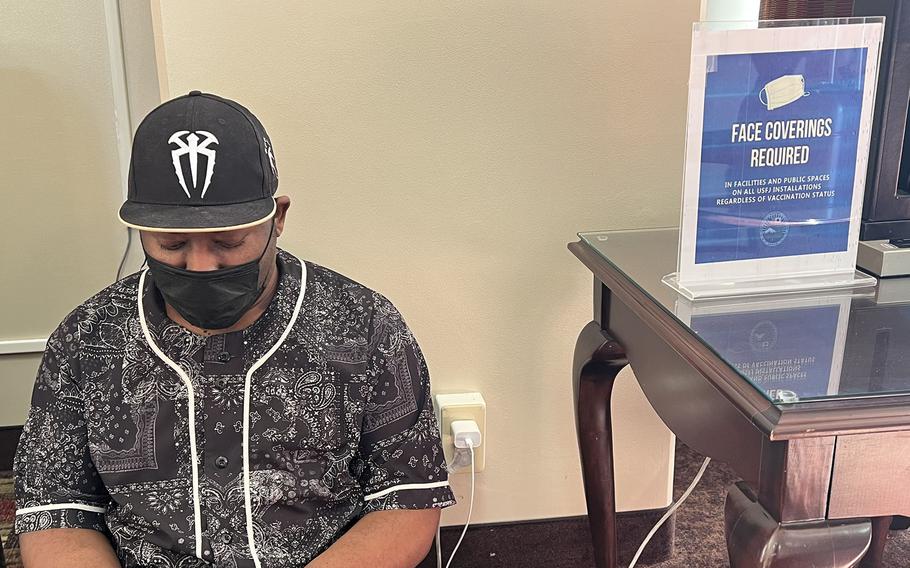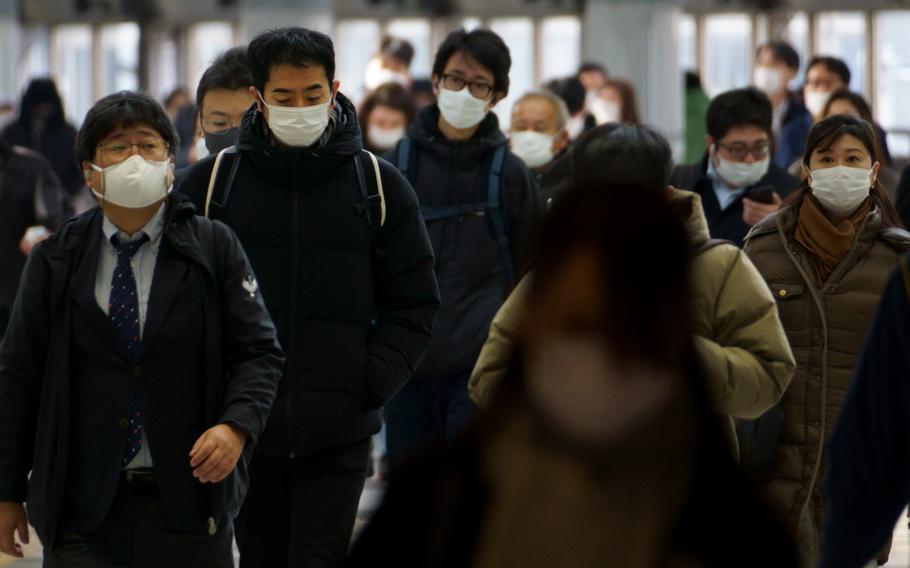
Airman 1st Class Joseph Butler of the 18th Security Forces Squadron at Kadena Air Base, Okinawa, wears a mask inside the Kanto Lodge at Yokota Air Base, Japan, Jan. 14, 2022. (Kelly Agee/Stars and Stripes)
Stars and Stripes is making stories on the coronavirus pandemic available free of charge. See more stories here. Sign up for our daily coronavirus newsletter here. Please support our journalism with a subscription.
TOKYO – The rapidly expanding number of COVID-19 infections in Japan’s capital city blew through another one-day record Tuesday, climbing to 12,813 new cases, according to public broadcaster NHK.
That’s 1,586 more infections that the previous one-day record set on Saturday, according to metropolitan government data online.
Meanwhile, the national government was prepared Tuesday to extend a quasi-emergency across another 18 prefectures for 34 of Japan’s 47 prefectures, NHK reported. Tokyo and the surrounding Kanagawa, Saitama and Chiba prefectures have been in a quasi-emergency since Jan. 19.
Emergency measures encourage bars and restaurants to close early and refrain from selling alcohol.
The emergency may also extend to Okinawa, Yamaguchi and Hiroshima prefectures, where public health emergencies were declared even earlier as the sixth wave, the omicron phase of the pandemic, took hold in December. The state of emergency would expire Feb. 20, beyond the original Jan. 31 deadline set last week.

Tokyo reported a one-day record of 12,813 new coronavirus infections on Tuesday, Jan. 25, 2022. (Akifumi Ishikawa/Stars and Stripes)
Japan reported 44,663 new COVID-19 infections nationwide on Monday, according to the Johns Hopkins Coronavirus Resource Center, a drop from the record 54,411 on Saturday.
U.S. Forces Japan on Tuesday reported 202 new cases of the coronavirus respiratory disease at 16 installations, with one individual awaiting confirmation. On Monday, the command reported 246 infections from the preceding day along with 15 unconfirmed cases at 16 installations.
Although numbers have fluctuated, new infections reported by USFJ on a daily basis have fallen from 810 cases on Jan. 12.
None of the U.S. military cases are seriously ill or hospitalized, according to USFJ.
The U.S. military population passed another day of a three-week isolation period scheduled to end Monday. The stay-at-home order keeps more than 55,000 service members, plus civilian employees and family members mostly restricted to their military installations or their homes off base.
The order, first imposed Jan. 10 for two weeks, was extended another week on Friday as case numbers across Japan rapidly multiplied and emergency measures in 12 prefectures went into effect.
Although the omicron variant, so far, comes with less severe illness, it is more easily transmissible, resulting in many more infections. Tokyo on Monday reported 36.7% of the hospital beds set aside for COVID-19 patients are occupied, along with 2.4% of beds for severely ill patients.
Yokosuka Naval Base, homeport of the U.S. 7th Fleet, confirmed 56 new cases, the highest among U.S. bases, according to USFJ’s Tuesday update. Yokota Air Base, USFJ’s headquarters in western Tokyo, came next with 35; and Marine Corps Air Station Iwakuni, 25 miles south of Hiroshima, reported 24.
Four Marine Corps bases on Okinawa and the Corps’ Combined Arms Training Center Camp Fuji southwest of Tokyo reported no new cases of COVID-19, according to USFJ.
Okinawa prefecture on Tuesday said it had another 1,175 new COVID-19 infections in its population and 50 among the U.S. military population on the island, according to the prefectural Department of Public Health and Medical Care. Kadena Air Base on Okinawa on Tuesday said it has 343 active cases in its population, according to an update on the base website.
Stars and Stripes reporter Mari Higa contributed to this report.